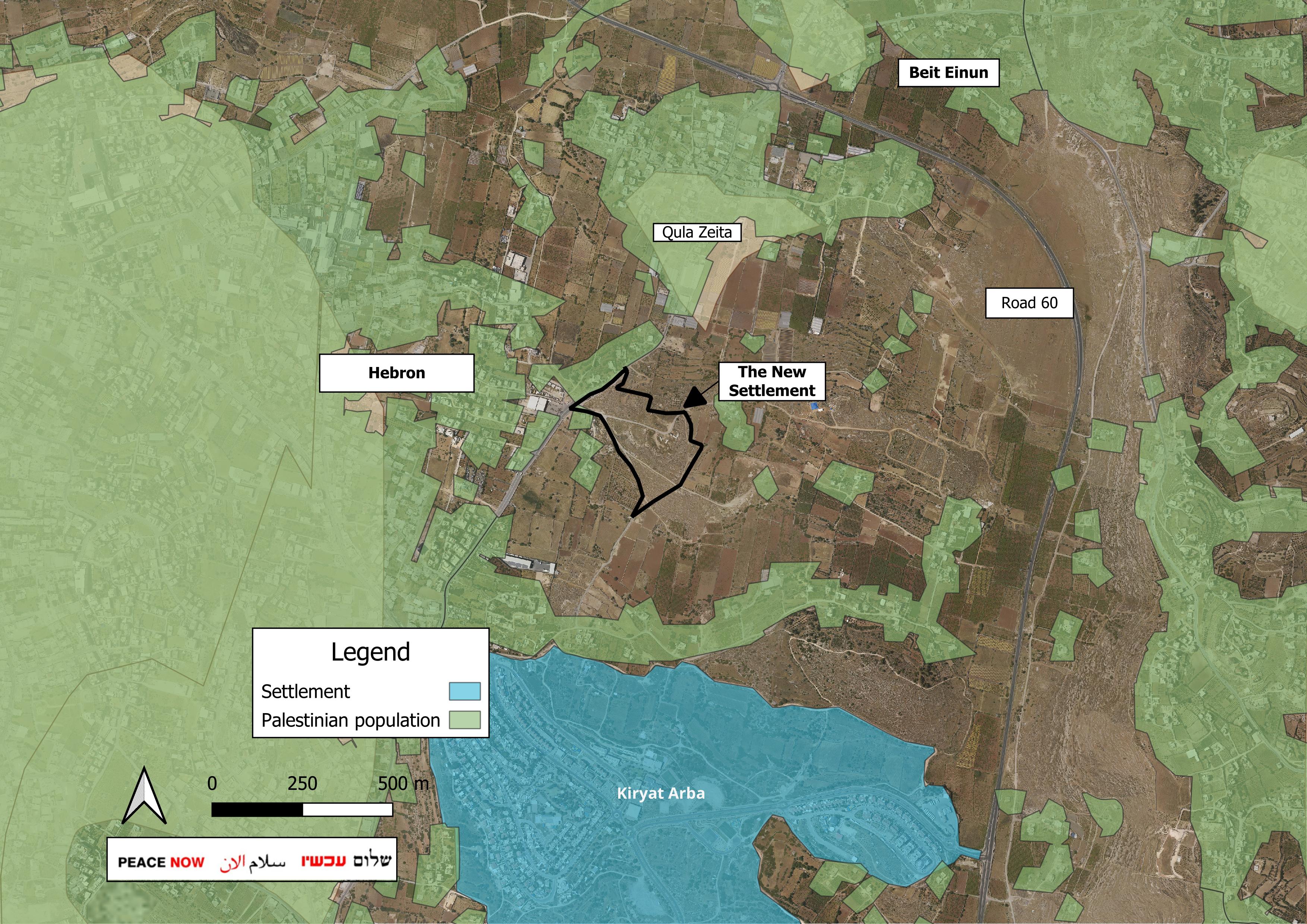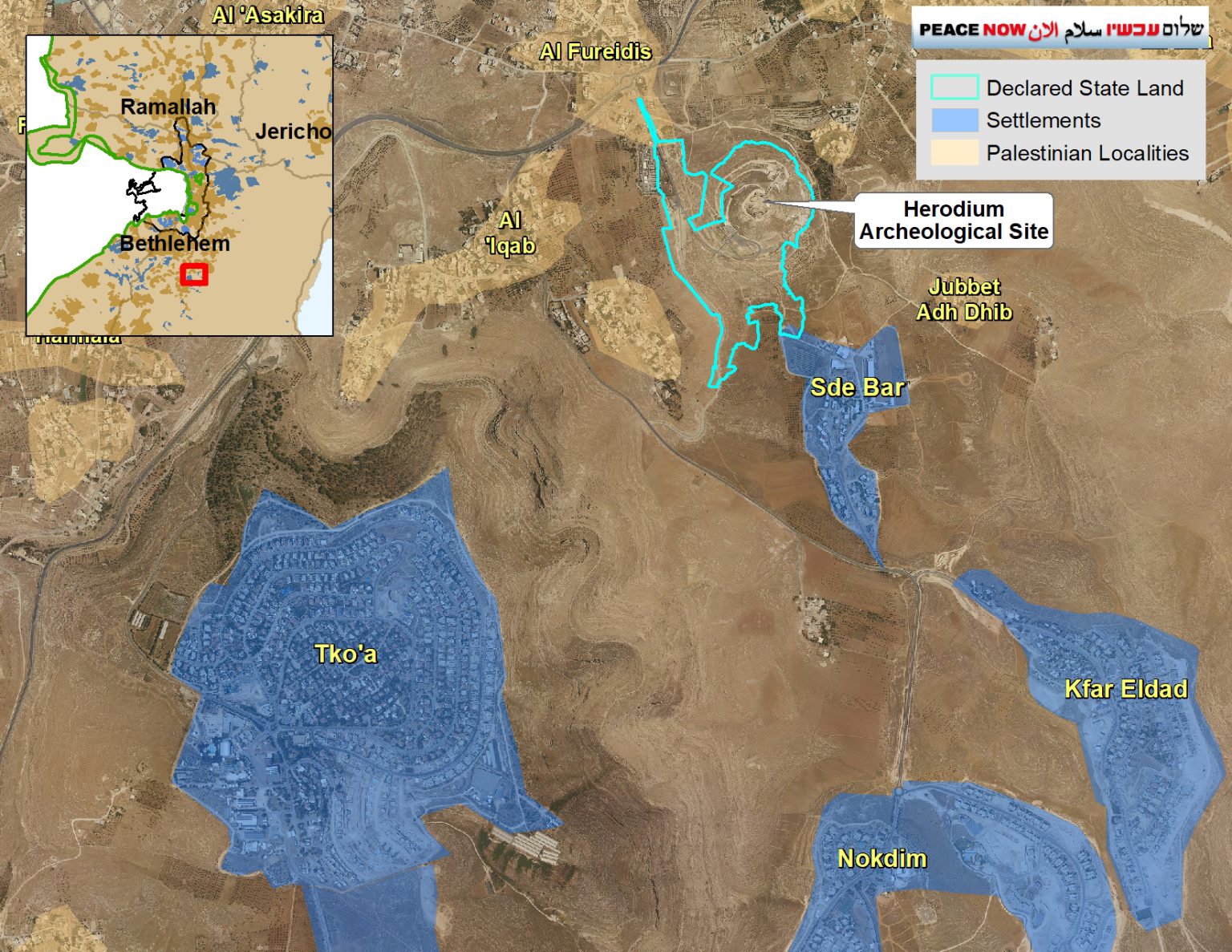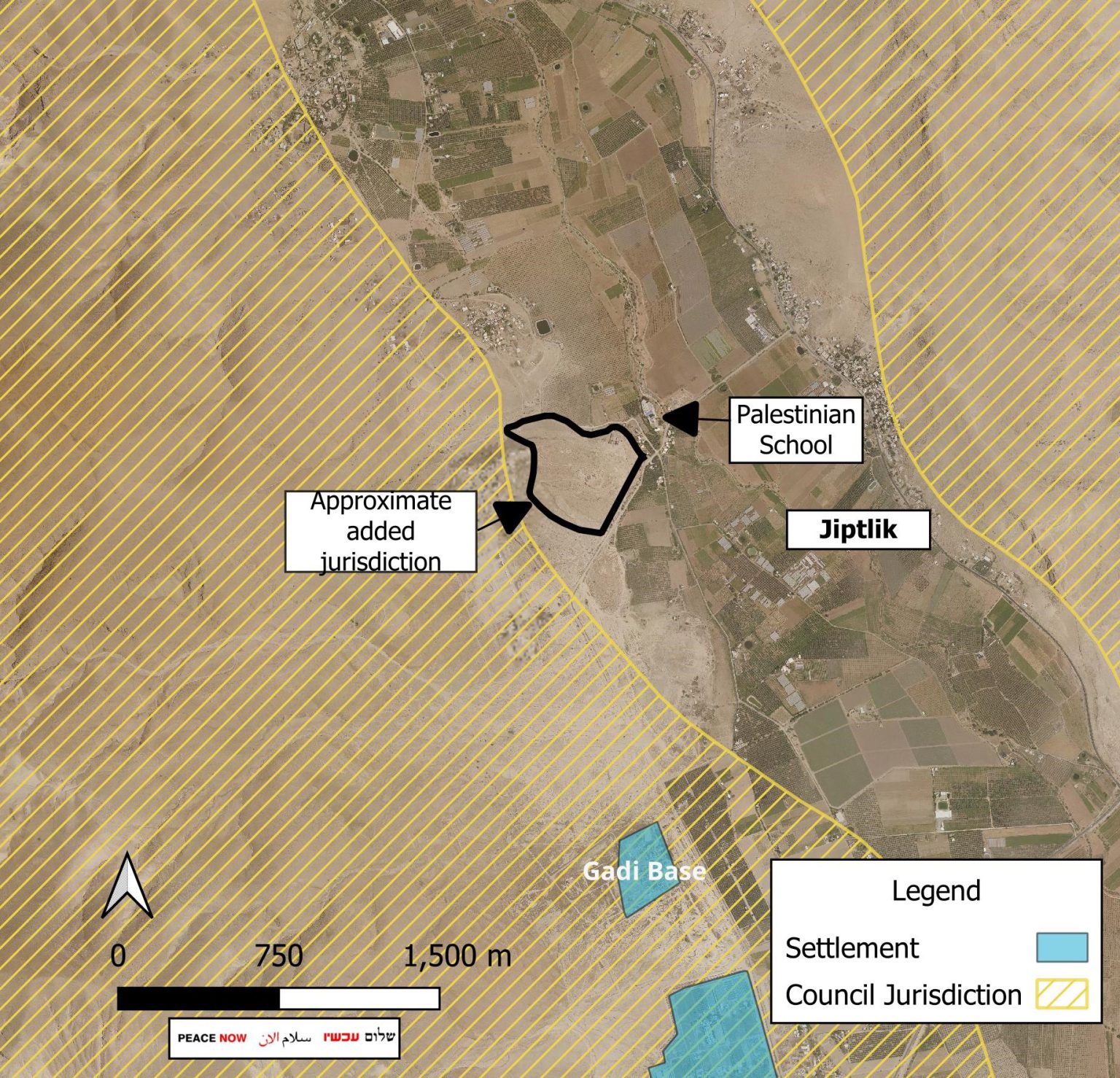Welcome to FMEP’s Weekly Settlement Report, covering everything you need to know about Israeli settlement activity this week.
To subscribe to this report, please click here.
April 5, 2024
- Israel Advances Plan for New Settlement In Hebron
- Archaeology as Tool of Annexation & Displacement, Part 1: Israel Declares Area Surrounding Herodium Site as “State Land”
- Archaeology as Tool of Annexation & Displacement, Part 2: Israel Expands Jordan Valley Settler Jurisdiction to Take Control of Archaeological Site in Heart of Palestinian Village
- Israel Police Assist Settlers Attempt to Take Control of Land in the Armenian Quarter/a>
- Israel Plans Sports Field of Nof Zion Settlement Enclave
- U.S. Plans to Enforce Label Requirement for Goods From Isreali Settlements
- Bonus Reads
Israel Advances Plan for New Settlement In Hebron
 Peace Now reports that on April 5th, the Israeli Civil Administration deposited a plan for the construction of 234 new units “in” the Kiryat Arba settlement near Hebron. However, the units are designated for an area that is not contiguous with the settlement, and in fact outside of the settlement’s fence and separated by a Palestinian population area. Israel is once again trying to pass off the establishment of a new settlement as the expansion of an existing one, having done so just last week with the announcement that it plans to legalize the Ahiya outpost as a “neighborhood” of the Shilo settlement, when in fact the two are not contiguous.
Peace Now reports that on April 5th, the Israeli Civil Administration deposited a plan for the construction of 234 new units “in” the Kiryat Arba settlement near Hebron. However, the units are designated for an area that is not contiguous with the settlement, and in fact outside of the settlement’s fence and separated by a Palestinian population area. Israel is once again trying to pass off the establishment of a new settlement as the expansion of an existing one, having done so just last week with the announcement that it plans to legalize the Ahiya outpost as a “neighborhood” of the Shilo settlement, when in fact the two are not contiguous.
Settlers have been living on these lands illegally since 2018, and have four caravans there currently. The government and settlers had originally planned to develop this area into an industrial site, but the new plan is for a residential area. The outpost area is only accessible via a road that goes through the Palestinian village of Beit Einun, and is lined with Palestinian homes.
Archaeology as Tool of Annexation & Displacement, Part 1: Israel Declares Area Surrounding Herodium Site as “State Land”
 Peace Now reports that on April 2nd, the Israeli Civil Administration issued an order declaring 42 acres (170 dunams) of land surrounding the Herodium archaeological site – located east of Bethlehem – to be “state land.” The Times of Israel reports that Gush Etzion Council Chairman Yaron Rosenthal welcomed the announcement and urged on the transformation of Herodium into a premier tourist center.
Peace Now reports that on April 2nd, the Israeli Civil Administration issued an order declaring 42 acres (170 dunams) of land surrounding the Herodium archaeological site – located east of Bethlehem – to be “state land.” The Times of Israel reports that Gush Etzion Council Chairman Yaron Rosenthal welcomed the announcement and urged on the transformation of Herodium into a premier tourist center.
Even prior to this declaration, Israel had declared my acres as “state land” in 2024 than it has in any year since the signing of the Oslo Accords (see these previous two declarations: 1 and 2). Peace Now calls the declaration of state land: “one of the main methods by which the State of Israel seeks to assert control over land in the occupied territories. Land declared as state land is no longer considered privately owned by Palestinians in the eyes of Israel, and they are prevented from using it. Additionally, the state leases state land exclusively to Jews.”
The seizure of this land entrenches Israeli control over Herodium and its surrounding areas, including the settlements that are near it (Sde Bar, Tekoa, Kfar Eldad, and Nokdim). As a reminder, a staff officer in the Israeli Civil Administration is tasked with managing all archaeological sites in Area C of the West Bank, and does so in close cooperation with the domestic National Parks Authority (erasing the Green Line). Herodium, located in Area C, was declared a national park in 1985.
Remarking on the current Israeli government, Peace Now said in a statement:
“The Netanyahu-Smotrich government continues to invest unprecedented efforts in deepening settlements. The declaration of lands as state land is an Israeli invention aimed at seizing territories in the West Bank and preventing any possibility of development by Palestinians. The Israeli public is fed up with a government that prioritizes settlements and tourism sites in the West Bank, while the economy and Israeli society are crumbling.”
Emek Shaveh – and Israeli NGO specializing in the role of archaeology in Israel’s occupation – wrote about the impact of Israeli control of Herodium:
“The Herodium Park was declared [an Israeli national park] in 1985. It spans more than 1,000 dunams and is located several kilometers southeast of Bethlehem…Several Palestinian villages are located around the Herodium site: Fureidis, Za’tara, Jib al-Dib, Beit ‘Ammar, and others. All these villages own land or homes within the park area. Their owners cannot cultivate their lands or even renovate their homes without the approval of the Civil Administration’s Staff Officer for Nature Reserves and National Parks. This prohibition applies to the renovation of the interiors of homes and even to repairing a ceiling to prevent leaks. The policy of authorizing the cultivation of the land is not clear to the residents either: some are entitled to continue to cultivate their lands while others have been prohibited from doing so. In the national park there are many signs directing visitors to restaurants, bed and breakfasts and other attractions, all located in nearby Jewish settlements. There are no Palestinian workers at the site.”
Archaeology as Tool of Annexation & Displacement, Part 2: Israel Expands Jordan Valley Settler Jurisdiction to Take Control of Archaeological Site in Heart of Palestinian Village
 Peace Now reports that on April 1st, the Israeli Civil Administration announced that it plans to expand the jurisdiction of the Jordan Valley Regional Council (a settler municipal body) to include the Tel-Mazar archaeological site which is located inside of the Palestinian village of Jiptlik, in Area C.
Peace Now reports that on April 1st, the Israeli Civil Administration announced that it plans to expand the jurisdiction of the Jordan Valley Regional Council (a settler municipal body) to include the Tel-Mazar archaeological site which is located inside of the Palestinian village of Jiptlik, in Area C.
Since the Civil Administration already has the authority to manage all archaeological sites in Area C (and does not need to extend the settler jurisdiction over the site in order to administer it), Peace Now speculates that the move is a precursor to establishing a settlement or tourist site near/at the Tel-Mazar site itself. Further, an old British-era police station is on the outskirts to these lands, which could potentially provide a way for settlers and the government to develop infrastructure for the site without government planning permissions.
Peace Now said in a statement:
“The area designated for inclusion in the council’s jurisdiction is not linked to any existing settlement but is situated within a Palestinian village. This represents another dangerous step in a series of actions by the Israeli government aimed at displacing Palestinians from Area C. Rather than seeking a long-term political solution, the Israeli government led by Netanyahu and Smotrich persists in advancing a pro-settlement agenda that exacerbates the dispossession and oppression of Palestinians in the West Bank, further escalating the current situation.”
Israel Police Assist Settlers Attempt to Take Control of Land in the Armenian Quarter
According to a statement by the Armenian Patriarchate released on April 3rd, Israeli police escorted settlers onto land known as the “Cow’s Garden” in the Armenian Quarter of the Old City of Jerusalem in an attempt to evict Armenian residents, including priests, from the area. The community stood its ground and refused to leave. The settlers assert that the lands were leased to them by the Armenian Patriarchate, a lease the Patriarchate contests the legality of and then formally canceled on October 26, 2023.
The Patriarchate’s statement reads:
“The Israeli Police’s intrusion into the Cow’s Garden affair, amidst two ongoing lawsuits in the Jerusalem District Court challenging the illicit land transaction, is not only unacceptable but a flagrant violation of legal norms. This aggressive interference has blatantly trampled on the rights of the Armenian community, reflecting a disturbing disregard for the rule of law and the principles of justice. Such actions mark a severe overstep by Israeli law enforcement authorities and an alarming infringement on the property and communal rights of the Armenians.”
Armenian civil society groups issued an appeal to the international community, saying:
“We implore the international community to recognize the significance of our cultural and historical heritage in Jerusalem and to stand with us in defense of our rights to exist as Armenians in Jerusalem.”
Israel Plans Sports Field of Nof Zion Settlement Enclave
Haaretz reports that the Jerusalem Municipality has approved a $540,000 (NIS 2 million) budget for the construction of a new sports field in Nof Zion settlement enclave, located in the heart of the Palestinian East Jerusalem neighborhood of Jabal Mukaber.
The Israeli government has already approved the massive expansion of the Nof Zion settlement, which FMEP has followed.
City Councilwoman Laura Wharton objected to the plan, saying:
“How is it possible for the city to spend such an amount for 100 families while outrageously neglecting all the other residents?…There cannot be such blatant and severe discrimination between city residents. Moreover, this is a boon to tycoons, who will surely profit from the extra services provided at the expense of city residents. The municipality must develop services for all the city’s residents and avoid serving anyone’s financial and marketing interests.”
U.S. Plans to Enforce Label Requirement for Goods From Isreali Settlements
The Financial Times reports that the Biden Administration is preparing to enforcing labelling codes that should compel Israeli settlements to label their goods in a manner that indicates they are produced in occupied territory, not as “Made in Israel” as the Trump Administration had allowed.
The labeling of settlement goods has been a global quandary for years – in which activists push their countries to accurately enforce its own labeling requirements, and the Israel demands that governments treat the settlements as part of sovereign Israel. A centerpiece of this battle is the case of the Psagot Winery, which has been a willing legal test case for the Israeli government’s efforts. In the waning months of the Trump Administration, the Psagot case was delivered a major victory when then-Secretary of State Mike Pompeo announced new U.S. guidelines that require products made in all areas under Israeli control to be labeled as “Made in Israel” (or iterations thereof) when being exported to the U.S.. Notably, this policy, if focused on territory rather than on people, would in principle require even Palestinian-made goods originating from villages in Area C to be labelled as “Made in Israel”. Roughly 150,000 Palestinians live in Area C, where they are subjected to an escalating Israeli campaign to make life untenable for them via discriminatory planning policies and demolitions.
To date, the Biden Adminstration has not reversed this massive and highly consequential shift in U.S. policy, continuing to passively offer recognition of Israeli sovereignty not only over settlements (as the Trump Administration has previously done) but over all of Area C – some 60% of the West Bank.
According to the report, the Biden Administration was close to reversing its labeling policy in March, following its February reversal of the Pompeo Doctrine. For a deep dive in the history of the Psagot settlement and the significance of former Sec. of State Mike Pompeo’s visit there in the waning days of the Trump Administration – check out this FMEP podcast with Dror Etkes, Fadi Quran, and Lara Friedman.
Bonus Reads
- “Ministry’s Plan to Boost Cellular Reception in Judea & Samaria” (Jerusalem Post)
- “War First, Then Annexation: Is Israel Preparing to Permanently Occupy Gaza?’ (Haaretz)
- “Editorial: Israel’s Third Objective: Permanently Seizing Northern Gaza?” (The Times of Israel)